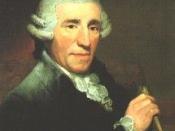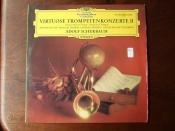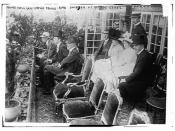Throughout history, many composers and musicians alike have strained to achieve independence from the public and the mediaÃÂs ideals, expectations and standards. Unfortunately, this is not a new issue in music culture, but for many creative and free thinking individuals, pleasing some form of authority and following the rules is the only way to make a living in a competitive field of study and work. This was true for Joseph Haydn, an eighteenth century composer who worked for Prince Paul Anton and later Prince Nicolaus, composing on cue for numerous people, holidays and celebrations, as well as religious music for times of worship. The contract held between Haydn and his patrons is detailed in itÃÂs description of the duties of Haydn as Vice-Capellmeister, and many comments have been made concerning itÃÂs fairness and HaydnÃÂs treatment in the court.
First and foremost, HaydnÃÂs contract gracefully states that Gregor Werner will retain his position as Ober-Capellmeister, and be responsible for the church music, whereas Haydn was expected to ÃÂtake charge of the orchestra and generally manage the courtÃÂs musical affairsÃÂ for the same wage.
Also, he was not allowed to associate with the musicians who were making his creations reality, and was to ÃÂabstain from undue familiarity, from eating and drinking and other intercourse with them, so as to maintain the respect due to him and preserve itÃÂ . He was to compose as the Prince commands, and not to ÃÂcommunicate such compositions to any other person, not to allow them to be copied, but he shall retain them for the exclusive use of His HighnessÃÂ . Thus, waiting for inspiration was not an option, and the music of Haydn could not easily be shared with the world. The music written by Haydn also was technically owned by the prince, and possibly the most difficult condition to follow as a composer was to ÃÂnot compose for any other person without the knowledge and gracious permission of his highnessÃÂ . This meant that if the Prince did not feel the need to grant permission, Haydn could not by any means write music for anyone he wanted to. His creativity, imagination, knowledge and all products of the application of that knowledge were sole property of the Prince. In addition to these legal shackles, Haydn was bound to other duties within the court as well. He was responsible for the punctuality and attendance of all musicians, supervised the work of the copyists and served as the conductor, composer, librarian, supervisor of instruments, and chief of musical personnel.
Although the aforementioned conditions do seem rather ÃÂstaggeringÃÂ , there are many rational points to the contract as well. For example, Haydn was expected to dress ÃÂneatly in white stockings, white linen, powdered, and with either pigtail or hairbagÃÂ . To any professional performing musician or composer/conductor, this is not a surprise.
Performance dress and conduct are still very much valued within popular music culture as well as small groups in small venues. It contributes to a level of professionalism of which career musicians should be proud. Also, it is said that Haydn received an extra 200 gulden secretly for his extra duties for some time, until Prince Nicolaus succeeded the royal title and made HaydnÃÂs salary increase official. When visiting London, Haydn ÃÂdiscovered that his reputation was capable of ensuring that he was treated with courtesyÃÂ , a sign that his career with the royal family was far from stunting his potential fame. Most interesting, perhaps, is the fact that many readers forget the society in which this contract was written, and without taking into account the cultural standards and other composerÃÂs contracts in HaydnÃÂs time, these documents cannot be properly criticized, as the information given is all relative to the readerÃÂs knowledge of the historical context. It is true that composing by order was ÃÂthe usual practice of every musician of his timeÃÂ and that contracts from Prince Paul Anton and Prince Nicolaus to other composers and musicians are ÃÂnot available for comparisonÃÂ .
It seems that a decision must be made on the fairness or unrealistic expectations of this contract, which as mentioned is hard to do from a twenty first century viewpoint. However, when paralleling these conditions to similar oneÃÂs in todayÃÂs society, it is evident that a composerÃÂs creativity would naturally be stunted by not only the duties of the job, but by the lifestyle within a court as well. It is well known that Haydn often had to plea for the PrinceÃÂs mercy in regards to maintaining the musicians he wished to have play his music, he was often found ÃÂrescuing individual musicians from dismissal or punishmentsÃÂ . One of the most disheartening stories relating to HaydnÃÂs life in the court was when he decided to surprise Prince Nicolaus by doing a concert on the PrinceÃÂs favourite instrument, the baryton. Haydn practiced on it without anyone noticing to prepare for the concert, but when he actually performed, the Prince was offended, and said that ÃÂHaydn wanted to usurp his position with regard to that instrumentÃÂ . Sadly, due to this incident and the nature of HaydnÃÂs position within the court, ÃÂHaydn never touched the baryton againÃÂ , an unfortunate but likely necessary course of action for someone in HaydnÃÂs position. For a composer and musician of HaydnÃÂs talent and proficiency, the complete avoidance of an instrument, especially one with which the composer is already familiar, is likely to be an incredibly difficult and unpleasant experience. Also, a point which must be revisited is the paragraph of HaydnÃÂs contract in which he is forbidden from composing for anyone other than the Prince, which was discussed in detail earlier on.
In conclusion, the conditions of patronage for any composer usually leave the individual much more confined than such inventive musicians and writers should ever be. The creative nature of those who pursue music is a nature of freedom, one where inspiration may take hold at any time, and for those of us living (or learning to live) in such a vocation, there are certain rules and guidelines which come with the lifestyle, many of which are historically rooted. Joseph HaydnÃÂs career is an example of this, but there are also many points to learn from rather than live. The balance between freedom and necessary income is an important level for musicians to find, and one which is truly instrumental in the development, work and entire career of anyone pursuing a future in composition, performance and any other aspect of musical life.
BibiliographyGeiringer, Karl. Haydn: A Creative Life in Music. Berkely, 1982.
Griesinger, Georg. Joseph Haydn: eighteenth-century gentleman and genius. University of Wisconsin Press, 1963.
Landon, H.C Robbin and Jones, David Wyn. Haydn: His Life and Music. London, 1988.
Raynor, Henry. A social History of Music. London, 1988.





